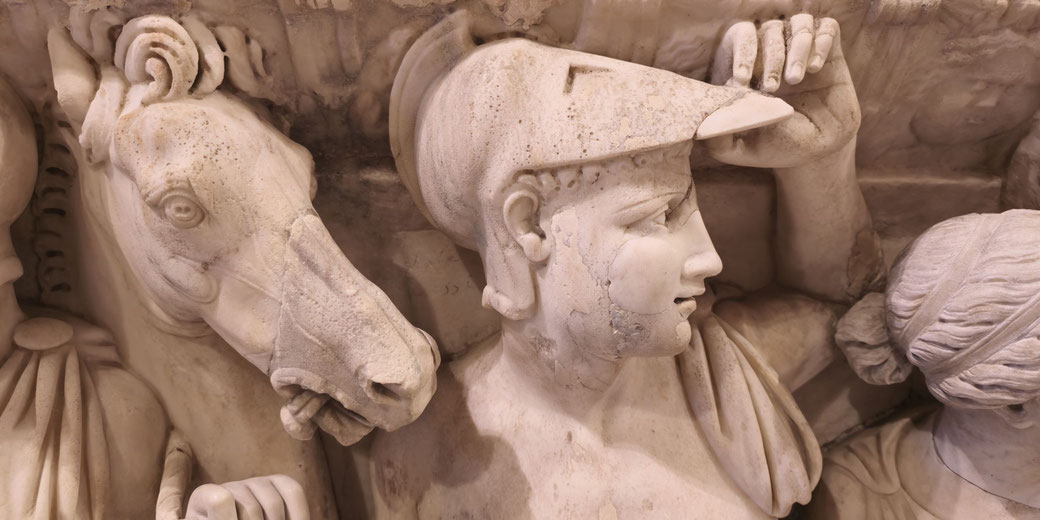Thucydides: The humiliated Athenian general who became one of the greatest ancient historians

Thucydides changed how people studied history more than most ancient writers. He used a method based on reasoned explanation and evidence.
After a personal mistake led to his exile during the Peloponnesian War, he wrote a detailed account of the conflict that challenged myth and put human motives at the centre of historical events.
As a result, he became one of the earliest writers to treat history as careful study instead of presenting it as entertainment or instruction.
Who was Thucydides?
Born around 460 BC, Thucydides came from the wealthy Athenian deme of Halimous. His family owned land in both Attica and Thrace.
His father, Olorus, had a Thracian name, and the family had ties to the region, though the idea of royal ancestry remains uncertain.
That background gave Thucydides early access to Athens’s elite members of society.
During the fifth century BC, he lived through the peak of Athens’s drive to expand its power.
Pericles led the city’s growth through its navy and tribute payments when Thucydides was young.
Athens’s cultural life produced writers, thinkers, and artists whose works were defining the tone of classical Greece.
Thucydides belonged to that group, but he learnt about rejecting unproven explanations without sufficient evidence.

Thucydides' military career in the Peloponnesian War
Thucydides served as a general in the Athenian navy during the Peloponnesian War.
In 424 BC, he led a small squadron near Thrace where he received orders to defend Amphipolis from a Spartan attack.
His family estates lay nearby, so he had local knowledge that should have helped.
However, the Spartan general Brasidas, who was well-known for his rapid movements and persuasive diplomacy, acted fast and captured the city before Thucydides arrived.
His delay caused a major loss for Athens and led to public anger.
The Athenian assembly likely sent him into exile soon after Amphipolis fell in 424 BC, though the exact date of the decree is unclear.
That punishment ended his military and political career, but gave him freedom to travel and record events without public limits.
He did not leave Athens. Instead, he used his situation to collect evidence, interview participants, and study the deeper causes of conflict.
His exile took him away from the noise of Athenian politics and let him observe events from both sides.
In the northern cities and rural areas of Greece, he continued to gather material.
During his time away from Athens, he studied the military actions of Sparta, Corinth, and other city-states.
This meant that he had access to information that would have been closed to a serving Athenian officer.
His outsider status broadened his view, but, as a former strategos, a general elected each year with both military and political duties, he knew the weight of command decisions.
The Peloponnesian War: Thucydides' masterpiece
Thucydides began his History of the Peloponnesian War during the conflict. He expected that the war, which began in 431 BC, would become the most important conflict in Greek history.
From the start, he avoided mythology that was common in writers like Herodotus, and focused on power, fear, alliances, and mistakes.
He explained the war’s outbreak by noting Sparta’s fear of Athens’s growth and treated that fear as a logical force in human affairs.
In the opening books, he included detailed speeches to express the views of each side.
He made clear that he did not record the exact words; rather, he aimed to reconstruct the arguments as closely as circumstances and memory allowed.
In Book 1, he stated that he aimed to capture the essence of what was said, rather than report word-for-word dialogue, in contrast to earlier writers who often blended fact with invented story.
These speeches gave the history its political depth. What is more, they revealed how leaders justified their decisions, how cities responded to threats, and how persuasion could influence war.
The contrast between speech and outcome allowed readers to see the failures of judgement that influenced specific events.
Among the most famous episodes, Pericles' Funeral Oration defended Athenian democracy as a model of civic virtue.
In the Corcyrean Civil War, Thucydides showed how language itself lost meaning as political norms collapsed.
Importantly, did not complete the work. The text ends in 411 BC, seven years before the final Spartan victory.
Scholars have debated whether Thucydides died before finishing it, or whether he chose to end it without a conclusion.
Later, Xenophon continued the story in his Hellenica. Regardless of its unfinished state, the eight remaining books provide one of the most exact accounts of warfare in ancient times.
His control over evidence and structured narrative established a new stage in historical writing, accompanied by a willingness to omit unnecessary detail.
At several points in the narrative, his study showed the limits of democracy. He did not glorify Athens, nor did he condemn Sparta.
He avoided emotion, and he studied the causes and reasoning behind each decision.
His writing explained how democracies made poor decisions, how generals misunderstood events, and how cities fell through miscalculation.
He avoided personal judgement, but he did not excuse failure.
Realism in Thucydides' writing
Not surprisingly, his account of the plague in Athens showed his style at its sharpest.
He detailed the symptoms, charted patterns of spread, and explained the breakdown of civic order with clear detail.
Modern scholars have debated whether the disease was typhoid fever, smallpox, or a similarly severe disease, though recent studies suggest typhoid fever as the most likely cause.
Regardless, he wrote to understand disaster rather than issue warnings of divine punishment.
Likewise, in the Melian Dialogue, he presented the cold logic of Athenian imperialism.
The Athenians claimed that the strong ruled where they could, and the weak obeyed because they must.
He neither explained nor judged these claims. He presented them instead as expressions of imperial logic.
Thucydides showed that the outcome, mass execution and slavery, followed from a clear set of choices.
Ultimately, Thucydides constructed a form of history that exposed human drive in its rawest form.
In this effort, he offered a view of the past that needed attention, and he provided no false hopes.
Later thinkers such as Hobbes and Machiavelli admired his realism, and modern international relations theory continues to draw on his ideas about conflict and power.
What do you need help with?
Download ready-to-use digital learning resources
Copyright © History Skills 2014-2025.
Contact via email
With the exception of links to external sites, some historical sources and extracts from specific publications, all content on this website is copyrighted by History Skills. This content may not be copied, republished or redistributed without written permission from the website creator. Please use the Contact page to obtain relevant permission.





